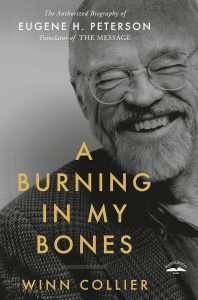 Summary: The first full (and authorized) biography of Eugene Peterson
Summary: The first full (and authorized) biography of Eugene Peterson
I have long been a fan of Eugene Peterson. There is something about him and his imagination of what it means to be the church and what it means to pastor people that resonates with me deeply. When his memoir came out, I read it twice in less than six weeks and then again about six months later, and I have read it at least once since then as well. I can’t think of any other book that I read three times in less than a year. So when I heard about a new biography, I jumped at the chance to get an advance copy.
It has been about a month since I started and about 2-3 weeks since I finished the book. I have been sitting with it. My last meeting with my spiritual director primarily talked through my response to it. One of the thoughts that came to me as I was reading was that in many ways, without really using the language of spiritual direction (although he does have one book where he does talk about spiritual direction), I think his pastoral method was spiritual direction. If you are not familiar with spiritual direction, that doesn’t mean anything. But to me, who is in training to be a spiritual director, it was revelatory to what draws me to his approach so strongly.
The early chapters, on Peterson’s childhood and family, felt light and almost verging on hagiography. There were problems identified, especially the distance between Eugene and his father and between his father and mother. But his childhood was presented as near idyllic. Collier points primarily to Eugene’s mother as his spiritual teacher, in part because the church does not seem to have mattered much at all. But something drew Peterson to God in ways that we can see both here and in The Pastor. But in neither was I really satisfied that it was explored enough.
In the college, seminary, and early years of the pastorate, I think there is a much clearer grappling with the whole of the man that became, eventually, the Eugene Peterson that many of us hold as a saint and mentor. I am not going to retrace his story in detail. I will re-read A Burning in My Bones again when it officially comes out on March 23, and maybe I will write about the book again then and trace it a bit more clearly.
But the most significant parts of A Burning in my Bones was the recounting of Euguene Peterson as a man who struggled. He struggled with calling. He struggled in seeking after God. He struggled as a father and husband, with alcohol, and with the life laid out before him. Those struggles did not turn me off of him but encouraged me as someone that also is trying to seek after God but certainly still struggles. Seeking after God does not mean that there is no struggle or that there is an always clear path laid out before our feet. What it does mean is that God is with us through the struggle. And what I was encouraged by more than anything else is seeing the life of a man, and his family, that strived to be faithful and who, from what I can see, was faithful in deeply encouraging ways.
I have no desire to read a hagiography. And I have no desire to lionize Peterson in unhelpful ways. But I want to seek after saints from prior generations and learn from them how I might also be faithful in ways that may help generations younger than I am.
A Burning in My Bones: The Authorized Biography of Eugene H. Peterson by Winn Collier Purchase Links: Hardcover, Kindle Edition, Audible.com Audiobook